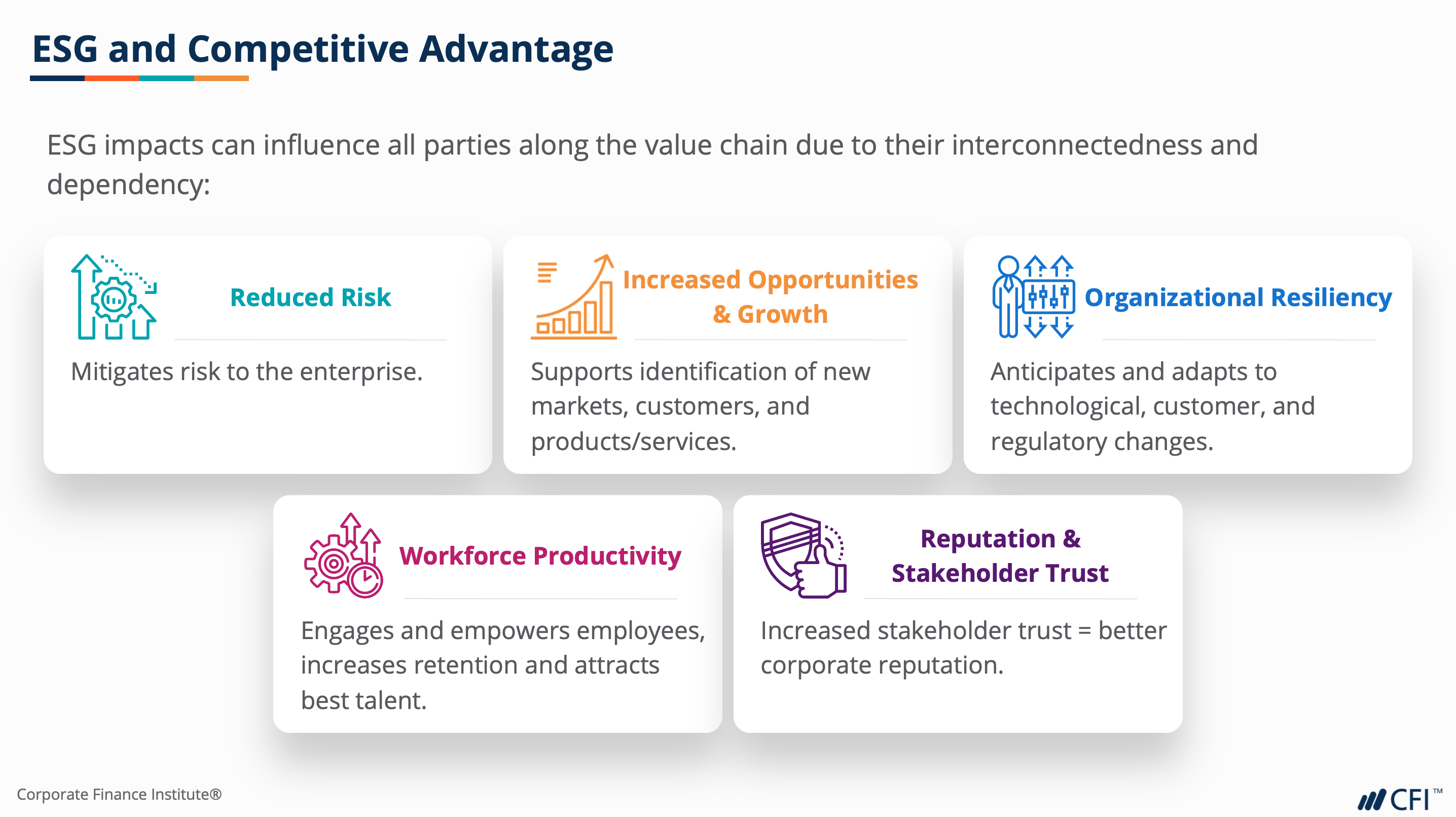There are many different types of environmental social governance training available, depending on an organization’s or individual’s needs. Some programs focus specifically on sustainable investing while others take a broader approach that covers all aspects of sustainability, including climate change mitigation strategies, water conservation practices, etc.
There is no one-size-fits-all solution when it comes to choosing an appropriate environmental social governance training provider, but some important factors to consider include the provider’s experience, the type of training offered, and the cost.
Table of Contents
What is Environmental Social Governance Training?
As the world progresses, so does the way businesses are conducted. Nowadays, more and more businesses are taking into account the environmental and social impact of their practices, which is where environmental social governance (ESG) training comes in.
ESG training provides businesses with the tools and knowledge they need to operate in a sustainable and responsible manner.
The training covers a wide range of topics, from climate change and environmental management to social responsibility and stakeholder engagement.
ESG training is important for businesses of all sizes, as it can help them to reduce their environmental impact, improve their social practices, and make more responsible decisions. It is also a great way to build public trust and confidence in a business.
There are a variety of ways to get ESG training, including online courses, in-person seminars, and certification programs. There is no one-size-fits-all solution, so businesses should select the type of training that best suits their needs.
Environmental social governance training is an important step for businesses to take if they want to operate in a sustainable and responsible manner.
The training provides businesses with the tools and knowledge they need to make more responsible decisions and reduce their environmental impact.
Benefits of ESG Training for Organizations and Individuals
Organizations and individuals face many challenges when it comes to environmental social governance training. Luckily, there are many benefits of this type of training.
Here are a few examples:
- ESG training can help organizations develop and implement policies that protect the environment and society.
- ESG training can help individuals learn how to be good stewards of the environment.
- ESG training can help organizations and individuals alike learn how to make better decisions when it comes to environmental and social issues.
- ESG training can help organizations and individuals communicate better.
- ESG training can help organizations and individuals work together more effectively to solve environmental and social problems.
Types of ESG Training
When it comes to making sure your business is sustainable and ethical, there are a lot of different moving parts. And while you might be familiar with some of the concepts of environmental, social, and governance investing, you might not know where to start when it comes to implementing these standards within your company.
That’s where ESG training comes in. By understanding the different types of ESG training available, you can make sure that your employees are up to speed on the latest sustainability practices and that your company is meeting its ESG goals.
1. Sustainability Reporting
Many companies are now required to report their sustainability performance using standardized metrics. This type of training will teach you how to compile and report your company’s data in a way that is compliant with the latest reporting standards.
2. Greenhouse Gas Accounting
As concerns about climate change continue to grow, more companies are being asked to account for their greenhouse gas emissions.
This type of training will teach you how to measure and report your company’s emissions in a way that is consistent with the latest standards.
 (Source)
(Source)
3. Sustainable Supply Chain Management
A key part of any company’s ESG strategy is ensuring that its supply chain is sustainable.
This type of training will teach you how to identify and assess the sustainability of your company’s suppliers, and how to implement sustainable supply chain management practices.
4. Sustainable Investing
As more investors look to put their money into companies that are doing good for the world, sustainable investing has become a hot topic.
This type of training will teach you about the different types of sustainable investments, how to screen for sustainable companies, and how to integrate sustainable investing into your overall investment strategy.
5. Corporate Social Responsibility
Corporate social responsibility (CSR) is a broad term that encompasses a company’s efforts to improve its impact on society.
This type of training will teach you about the different types of CSR programs, how to develop and implement a CSR strategy, and how to measure and report your company’s CSR performance.
No matter what type of ESG training you’re looking for, there are a variety of resources available to help you get started.
By understanding the different types of training that are available, you can make sure that your employees are up to speed on the latest sustainability practices and that your company is meeting its ESG goals.
How to Choose the Right ESG Training Provider for Your Needs
When it comes to environmental social governance (ESG) training, it’s important to find a provider that offers a comprehensive program that covers all the key topics.
Here are some things to look for when choosing an ESG training provider.
1. Look for a Comprehensive Program
The program should cover all the key topics, including environmental management, social responsibility, and governance.
2. Choose a Provider With Experience
Look for a provider that has experience delivering ESG training. This will ensure that the provider is familiar with the topic and can offer a high-quality program.
3. Consider the Provider’s Credentials
When choosing an ESG training provider, it’s important to consider the provider’s credentials. Make sure the provider is certified by a reputable organization such as the Global Reporting Initiative (GRI).
4. Ask About the Provider’s Success Rate
When you’re looking for an ESG training provider, ask about the provider’s success rate. Find out how many organizations have successfully implemented the provider’s training program.
5. Get a List of References
When you’re considering an ESG training provider, be sure to get a list of references. This will allow you to speak with other organizations that have used the provider’s services and get their feedback.
FAQs About Environmental Social Governance Training
How do I get an ESG certification?
To earn the ESG designation, candidates must successfully complete a series of online classes and tests covering topics such as climate change, water security, human rights, and responsible investing.
What is ESG training?
Environmental, social, and governance (ESG) reporting is a topic of interest to both the public and private sectors as more and more investors are demanding more transparency.
Which ESG certificate is best?
The ISF and ISB certifications are globally recognized and highly regarded as marks of excellence in sustainability. They signify that the recipient has attained the highest levels of professional competence and ethical standards.
Conclusion
Environmental social governance training is an important way for organizations and individuals to learn about best practices for integrating ESG considerations into decision-making.
With so many different types of programs available, it’s important to choose the right provider that can offer the specific type of training needed.
By taking into account factors such as experience, cost, and the type of program offered, you can be sure to find a solution that fits your needs perfectly.
{“@context”:”https:\/\/schema.org”,”@type”:”FAQPage”,”mainEntity”:[{“@type”:”Question”,”name”:”How do I get an ESG certification?”,”acceptedAnswer”:{“@type”:”Answer”,”text”:”
To earn the ESG designation, candidates must successfully complete a series of online classes and tests covering topics such as climate change, water security, human rights, and responsible investing. “}},{“@type”:”Question”,”name”:”What is ESG training?”,”acceptedAnswer”:{“@type”:”Answer”,”text”:”
Environmental, social, and governance (ESG) reporting is a topic of interest to both the public and private sectors as more and more investors are demanding more transparency. “}},{“@type”:”Question”,”name”:”Which ESG certificate is best?”,”acceptedAnswer”:{“@type”:”Answer”,”text”:”
The ISF and ISB\u00a0certifications are globally recognized and highly regarded as marks of excellence in sustainability. They signify that the recipient has attained the highest levels of professional competence and ethical standards. “}}]}





